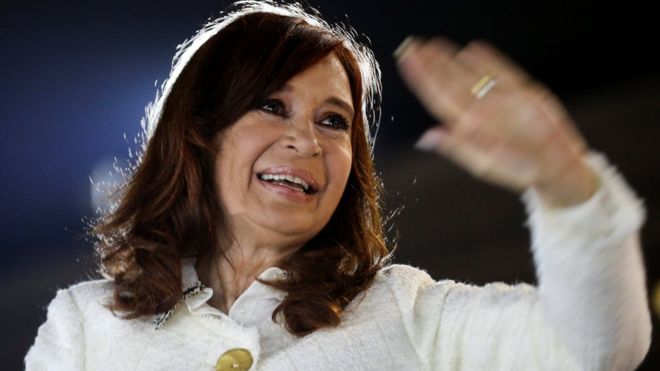
In a dramatic comeback, Cristina Fernández de Kirchner, progressive and one of Argentina’s most popular presidents during her two terms in 2007-2015, has been voted back into office as vice president.
A large crowd of supporters burst into a roar outside the Frente de Todos (Everybody’s Front) party bunker in the Chacarita neighborhood of the capital city of Buenos Aires at 9 p.m. when preliminary official results gave the victory to presidential candidate Alberto Fernández and vice presidential candidate Cristina Fernández de Kirchner. Alberto Fernández is no relation of Cristina Fernández de Kirchner.
His victory was widely expected and car horns started sounding non-stop in Buenos Aires after polling booths closed at 6pm on Sunday celebrating his victory.
Incumbent right wing Mauricio Macri conceded defeat on Sunday night.
Joined by Cristina Fernández de Kirchner, president-elect Alberto Fernández gave a fiery speech to a crowd of supporters at the Frente de Todos Bunker.
Thanking Argentines onstage, the former Cabinet chief paid homage to late Néstor Kirchner and said he would need the support of Mauricio Macri’s administration to reconstruct what he called the inherited “ashes” of Argentina.
“The only thing that concerns us is that Argentines stop suffering once and for all,” he told the crowd. “We’re back and we’re going to be better!”
With more than 96 percent of votes counted, the Frente de Todos leader had around 48 percent of the vote.
Presidential rivals Roberto Lavagna and President Mauricio Macri both contacted Fernández, congratulating him on his victory.
“The times ahead are not going to be easy,” Alberto Fernández told supporters.
Fernández started his speech by thanking voters for “voting for an egalitarian, a joined Argentina. One that values our workers, that values our teachers.”
“From here on now on, we only have to do what we promised. Each word that we gave, each promise, was a moral and ethical contract with all Argentines,” he said, flanked by Peronist leaders and human rights figures.
Screaming into the crowd, Fernández emphasized the promises made on the campaign trail and his intention to work for the people.
“Knowing what we promised, we’re going to do everything in our power for the factories, the shades of all the factories to rise up once again. For those businesses, and every one of their workers to once again have jobs. So that public education is not a disgrace, so that the universities in the interior of the country are dignified. So that our scientists don’t have to migrate and leave our country because our country mistreated them,” he declared.
“That,” he said, “is the job I signed up for.”
Alluding to the Peronist past, Fernández told a lively crowd “[they] are going to rebuild the country our elders did because we do deserve it”
Fernández also thanked his vice-presidential candidate and running mate, Cristina Fernández de Kirchner, echoing her earlier words that their coalition would govern for all of Argentina.
“And just like Cristina said: this isn’t our front, it is the front of the people”
The Kirchners were mentioned heavily in the victory speech, with kind words set aside for both Néstor and Cristina.
Acknowledging Néstor’s death, nine years ago, Fernández told the crowd that “on a day like today, a 27 of October, Néstor left us. It wouldn’t be fair to not recognize him for the power that he gave us.”
The victory puts an end to the pro-business economic policies of Macri’s administration, who promised “zero poverty” during his electoral campaign but exits office with a plunging peso, an inflation rate that rocketed to an annual 56% and the number of people living beneath the breadline having risen from 29% to 35%.
The economy has taken center stage with the country in the grip of recession for most of the last year, the outlook for growth darkening, and job numbers down.
President-elect Fernández, who assumes office on 10 December, is a moderate Peronist who has pledged to respect the $57bn IMF loan taken out by Macri last year to try and salvage Argentina’s creaking economy while promising to improve wages and benefits for workers and pensioners.
The ballot was effectively a referendum between rightist Macri’s austerity and the left-leaning opposition, who have attracted voters hurt badly by the Macri’s neoliberal model that led to the most severe economic crisis in decades.
Argentina’s choice could have far-reaching implications: it is one the world’s top grain exporters, is stirring the energy world with its huge Vaca Muerta shale field and is on the cusp of restructuring talks with creditors over US$100 billion in debt.
Alberto Fernandez was a relative unknown political figure until this year outside Argentine political circles.
Argentina’s elections, traditionally held the last Sunday of October, coincided this year with the ninth anniversary of the death from a sudden heart attack of Néstor Kirchner, the husband and predecessor in office of Fernández de Kirchner. During his 2003-2007 administration, Kirchner led Argentina’s astounding recovery from its economic collapse and monumental foreign debt default in 2001-2002. The couple headed Argentina’s presidency for a successive 12 years in 2003-2015.
Earlier reports said:
Around the country, in an overcast Buenos Aires, amid the Pampas farmlands and the vineyards of Mendoza, polling stations opened their doors at 8 a.m. Voting ended at 6 p.m.
SIGN UP FOR COUNTERCURRENTS DAILY NEWS LETTER










































